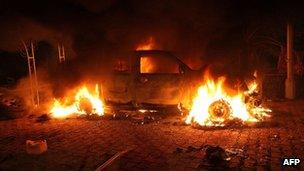Meeting Libya's Ansar al-Sharia
- Published

US officials said the attack on the embassy was too well co-ordinated to have been spontaneous
No-one knows for sure yet who carried out the attack which resulted in the death of the US ambassador to Libya, but suspicion has already fallen on the radical Islamist group Ansar al-Sharia.
Earlier this summer, I made a trip back to Benghazi, Libya's second city, ahead of the country's first post-Gaddafi nationwide elections.
There had been a spike of pre-election violence, especially in the east, and many Libyans were accusing a shadowy fundamentalist group that had emerged in the city that spawned the uprising against Col Muammar Gaddafi.
There had been an attack against a vehicle convoy carrying the British ambassador. There was a similar incident involving the UN's envoy to the country and even the Benghazi base of the International Committee of the Red Cross came under fire.
Most strikingly, video had emerged on the internet of a small group of young men desecrating and destroying Allied war graves in Benghazi's two Commonwealth war cemeteries.
Less high-profile incidents had also taken place across the city - among them, a drive-by shooting at a western-style hairdressing salon and anti-democracy protests in the main square.
We tracked down and arranged a meeting with Ansar al-Sharia members in a run-down area of central Benghazi, just off a small park where other men passed the day drinking coffee.
Unfortunately the group had made it clear they were not willing to be interviewed on tape, nor would they speak to female members of our team.
I met about four men in a sparsely furnished room on the fourth floor of a tower block. One middle-aged man, who called himself "the Sheikh", did most of the talking while four much younger men sat and listened.
While they seemed to care little for explaining their philosophy or methods to western journalists, they did not deny involvement in anti-democratic stunts.
Koran and Kalashnikov
As for the attacks on Western targets, they said they did not know who the perpetrators were, but alleged that "Western intelligence agencies" based in Libya were to blame because they wanted to undermine Sharia, Islamic law.
In a written statement, the group also told us why they rejected the electoral process then taking place across the country - even though Col Gaddafi, who had like many other Middle Eastern dictators suppressed the activities of Islamist groups, was dead and they were again free to organise.
"Democracy is a human condition where laws are made by people," said a brief statement from the Ansar al-Sharia group, on headed notepaper that contained the twin symbols of the Koran and a Kalashnikov rifle.
It went on: "Only God has the authority to make law and that is why Islam and Sharia are incompatible with democracy."
I never got the impression from my time in Benghazi or elsewhere in Libya that Ansar al-Sharia, and other extreme Islamist organisations, were large in number or particularly well supported.
Indeed, they were pretty much routed in the elections that returned a moderate Muslim Congress.
But as the terrible events of this week showed in Benghazi, with so many weapons at large in Libya and so much anger to tap into, even small organisations like Ansar al-Sharia could yet undermine the new, democratic Libya and its relationship with its Western supporters.
- Published13 September 2012
- Published13 September 2012
- Published12 September 2012